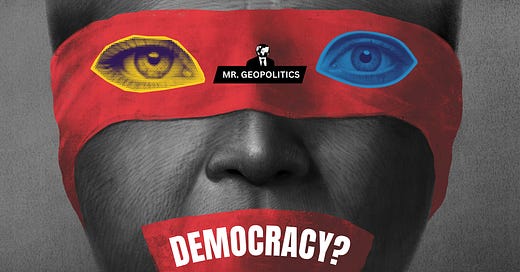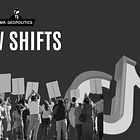⚖️🗣️ MUST READ: A New Era of "Dangerous Politics" Begins
The conditions for massive unrest and revolt are forming
What happened to civil disagreement?
Many have been watching as it has been disappearing for years. Whether it is Gen Z or boomers, few conversations can now take place peacefully between those with opposing viewpoints. Forget critical (required) discussions about politics or even religion, which are guaranteed to descend into fighting. Today, attempt a conversation about tariffs or technology and see where it ends up.
Alarm bells have been ringing. Without civil disagreement, societies start to become “tribal” and polarization inches towards extreme levels.
📣 POPULAR INSIGHTS ON THIS TOPIC
This, in turn, will disintegrate countries along ideological, ethnic, economic, and political lines, putting national progress and unity at stake. While the majority have ignored the decline of civil disagreement and the warnings, this is no longer possible.
The inability to accept an opposing opinion or viewpoint, even the most radical one, has evolved into blocking and banning a particular set of ideas and outlooks.
The picture in plain view of tens of millions in so-called “free nations” is one where politicians are being locked up, locked out, or sidelined, because their policies and prescriptions go beyond the accepted “threshold of disruption” - a threshold set by populations who for decades have given politics the cold shoulder.
What is taking place now should jolt everybody, from those with the power to elect to those who are elected.
The steps being taken against certain individuals and groups represent a turning point for democracies, which comes with seismic consequences for the West and its adversaries.
DANGEROUS POLITICS
Over the past several months, dangerous politics have been spreading in the world.
First, the Romanian government canceled its presidential election after a little-known, right-leaning candidate, Calin Georgescu, surged to first place in the initial round of voting. As fears rose, including over the role of TikTok and foreign interference, Romania did something unthinkable: it canceled its presidential election. Then, several months later, it banned Georgescu from running in the new presidential elections slated for May. A few days later, Romania banned a separate right-leaning candidate, Diana Șoșoacă, from participating in the national leadership race.
Second, shortly after Germany called a snap federal election after its “traffic light” coalition fell apart, almost at the same time that Donald Trump was reelected in the US, the spotlight turned to AfD, once a peripheral party in German politics. But, after AfD surged in the EU Parliamentary elections in June 2024, and then won the state elections in Thuringia in September 2024, its first such victory since WWII, concerns have been rising. This led to a shock proposal in the Bundestag (parliament) before the elections in February 2025: ban AfD from the elections.
Third, after a contentious election in Georgia, which resulted in the pro-EU, incumbent president Salome Zourabichvili, refusing to view the newly-crowned president, Mikheil Kavelashvili, as legitimate, the EU and US raised the heat, including the threat of sanctions and Brussels warning that Georgia’s ability to join the EU was effectively on ice. However, Georgia’s new government itself announced that it was suspending talks to join the EU. All of this has culminated in calls for Georgia to “redo” its election.
Fourth, after leaving office at the beginning of 2023, Jair Bolsonaro has been under the legal eye, which resulted in the former Brazilian president leaving (or fleeing) the country for Florida at the end of 2022. As the back-and-forth between Bolsonaro and the Brazilian prosecution has grown, in March 2025, the former Brazilian leader was forced to stand trial for allegedly staging a coup against the incumbent. If he is found guilty, he could face up to 12 years in prison. In June 2023, a Brazilian court banned Bolsonaro from running for higher office for eight years.
Fifth, and lastly, the most recent example of dangerous politics is in France, where Marine Le Pen, who leads the National Rally group in the French parliament, representing several parties, was found guilty of embezzling money for political purposes. This bans Le Pen from running for public office for five years. The guilty verdict also sentenced Le Pen to four years in jail, however, two years have already been suspended and the remainder will be house arrest. This blocks Le Pen from running in the upcoming French presidential elections in 2027, at a moment when her support was rapidly expanding.
All of the above has not taken place over decades but over months. And, the places where dangerous politics is emerging, are not just small states with a history of dictatorships. Rather, unthinkable events are occurring in nations once considered bastions of democracy like politicians being banned, parties being banned, or calls for elections to be redone.
This creates a new set of risks and challenges for these nations, most of which are flying under the radar.
CHAOTIC WEST
As unprecedented political action takes place, the seeds of major unrest and revolt are being sown in societies worldwide, but in particular in the West, which is also at the beginning of its most significant geopolitical battle since WWII.
As China rises as a global superpower, flanked by Russia, Iran, and others, any “internal disruptions” in the West will work to the advantage of Beijing and its partners. This includes Western infighting like a US-EU divorce or a North American trade war. In fact, with the latter, China has already approached Canada to propose a new free trade deal and has put BYD on the table as a new investment option, at a time when trade ties break down between Ottawa and Washington, including around autos.
Depending on how far the situation goes, as politicians are locked out or locked up, the West faces a new kind of breakup.
After Le Pen’s verdict, the deputy prime minister of Italy, Matteo Salvini, called the prosecution a “declaration of war.” This is how the “other side,” made up of like-minded individuals, allies, and supporters, perceives and interprets what is happening. Going after certain politicians is being treated as a watershed moment where action now has to be taken. But, what action?
In the case of Europe, a new sentiment is spreading where the current landscape, led by the EU, is not working for conservatives. Action may soon be taken to informally or formally “loosen” the control of Brussels over conservative states, which may evolve into a bloc. The ruling against Le Pen may be viewed as the biggest sign that the right-leaning voices in Europe are “under attack” and without offensive moves, similar ideas and outlooks will be charged elsewhere.
But outside of Europe, moves against politicians and ideas could jumpstart a different kind of breakup: secession.
In the US, the union between all 50 states has never been more fragile. A recent convening of US governors in the White House resulted in a quick, public spat between US President Donald Trump and the Governor of Maine, Janet Mills, as the White House moves to ban trans-athletes from competing in girls sports, a decision that Maine has said it will not comply with. In response, Trump has threatened to withhold federal funding for Maine.
Meanwhile, at the beginning of February, the state of California passed $50 million in funding to defend against Trump’s actions, including executive orders. On the other side, some states are standing shoulder-to-shoulder with Trump, like Texas, whose governor Greg Abbott warned the former Canadian prime minister Justin Trudeau that the Texan economy is larger than Canada’s as Ottawa debated ways to hit back at Trump’s tariffs, including restricting energy exports.
While divisions between states have always existed, US states are in a very different position today. Across the board, the policies being passed or repealed affect the very identity of nations. If US states are not on board with what is on the table, then they are split on the basic fundamentals of America. Eventually, a law or policy will cross a “red line” and push a US state or a collection of them into a different gear. Whether it is because a politician cannot run for office or an idea is under siege, secession may return to the spotlight.
From Europe to the US, what is taking place against politicians/ideas is not the end of the line. It is the beginning of a new fight, one where the stability of societies and the future of nations and unions is on the line.
SOCIAL REVOLT
Besides the big geopolitical shifts, like the EU breaking up or US states seceding, there are two other major consequences as nations enter a period of dangerous politics.
The first is that major social revolt is no longer a distant possibility but a real risk.
Every single global stakeholder must understand that arresting a politician or banning them from public office does not stamp out the broader movement they represent. In today’s climate, with major economic pains (i.e. stagflation), the growing divide between the rich and poor, and extreme polarization, going after a candidate like what is taking place in parts of Europe, almost guarantees to activate supporters.
Those people, whether in the hundreds of thousands or tens of millions, have to be able to express their concerns, frustrations, and desires. They cannot be muzzled. Attempts to do so create a pressure cooker of sorts, where eventually, these people believe the system is stacked against them and without revolt, things will not change for the better.
Fears of civil war have been spreading in the US, France, and elsewhere. Now, those fears return with a vengeance as politicians and the ideas they represent are treated as persona non grata by the state.
The second is that, by taking dangerous political action, whatever trust exists in the government and institutions will disappear.
In France, Marine Le Pen’s supporters, regardless of their viewpoint, no longer view the French legal system as impartial and objective. In the US, Trump supporters no longer trust that the government is regulating Big Tech to protect conservatives. In Germany, AfD supporters likely think that the optics are stacked against it, in part because of Berlin.
This is not a question of whose ideas are right or wrong (if that discussion is even possible). This is a question of whether societies are reaching a point where large chunks have lost faith in the core governing systems of the nation.
If millions view the executive, legislative, and judicial, as overtly political, deeply biased, or even corrupt, their “link” to the country as a whole changes. With such an outlook, millions are quite simply biting their tongue until a moment arrives when they can change the systems.
A split is growing in nations between those who stand by the systems and those who do not, echoing a status quo that has led to major revolutions and uprisings in the past.
3 KEY TAKEAWAYS👇
A new dawn of dangerous politics has begun: Whether a politician is arrested or banned, ideas are on the chopping block. Ideas cannot be killed. The notion of putting a candidate behind bars or redoing an election to get a different result was once unthinkable, but this is now the status quo. This puts nations in a dangerous position, as millions feel the government is coming after them and is no longer working for them.
West could be undone from within, not from China: While the focus in the West is on the fight with China, perhaps the greatest threat is within Western borders. The spreading political polarization, erosion of trust, and national disintegration, are quickly approaching a boiling point. If France descends into major social strife or talk of secession in the US becomes loud, Western capitals will not be able to address the big geopolitical challenge. In the process, China and others, who are not dealing with the same internal revolts, will glide onto the throne.
A new social contract is needed now more than ever: The basic and unspoken contract between the people and government is dead. Nobody agrees on the basic norms and ideas anymore. A new social contract is needed, one that can bridge divides and reunite nations. Equally important, this new social contract must address the weakening rule of law, where different parts of government are effectively ignoring each other’s rulings and jurisdictions.
CONCLUSION
Geopolitics is usually very high-level - like US-China or the new era of geoeconomics. But, at the core of geopolitics are nations and people. And, defining nations and people is the construct of societies.
This means national politics, which spins societies, also spins geopolitics. Today, national politics has lost balance, between right and left, between need and desire, between the people and the state.
This pushes national politics into dangerous, extreme directions. Everything is now on steroids. While at some moments in a journey, radical ideas are needed to reposition a lost ship, what is looming today is quite different. The new trajectory of countries seems to be radical, driving more divisions on the world stage and splitting democracy into different shades.
The big question now is whether nations can operate as politics adopts a new form. Or whether countries will buckle, as the prosecution of politicians and ideas sets events in motion that cannot be undone.
-ABISHUR/MR. GEOPOLITICS
Mr. Geopolitics is a commercial service providing actionable insights to leaders. All Mr. Geopolitics content is the property of Abishur Prakash/The Geopolitical Business, Inc., and is protected under Canadian Copyright Law. This includes, but is not limited to: ideas, perspectives, expressions, concepts, etc. Any use of the insights, including sharing or interpretation, partly or wholly, requires explicit written permission. If you would like to discuss options, please contact: mrgeopolitics@substack.com.
Want to republish this insight? Let’s talk: mrgeopolitics@substack.com.
If you like Mr. Geopolitics, your colleagues might too.
Feel like doing something unique for somebody important?









